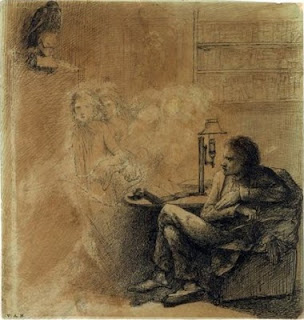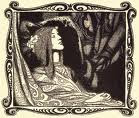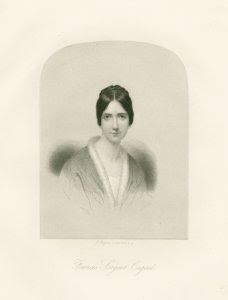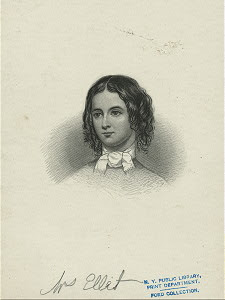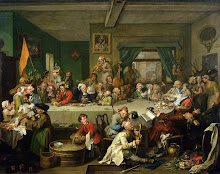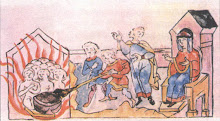"Never pursue literature as a trade."
-Samuel Taylor Coleridge
 The great ambition of Edgar Allan Poe's professional life was to have the means to run a magazine of his own design. His failure to do so is one of the major "what-ifs" in his eerily unlucky life, as well as one of its mysteries.
The great ambition of Edgar Allan Poe's professional life was to have the means to run a magazine of his own design. His failure to do so is one of the major "what-ifs" in his eerily unlucky life, as well as one of its mysteries.The question of why he failed to achieve this goal is one that his biographers have never been able to fully explain. His plans to establish a publication of his own appeared to fail at different times, for different reasons, but the details remain oddly obscure.
Poe first seriously pursued founding a magazine in 1840. He was increasingly exasperated with his job as editor of "Burton's Magazine," and he had come to personally despise his employer, William Burton. His unpleasant experience with Burton (and earlier, with Thomas W. White's "Southern Literary Messenger,") led him to the logical conclusion that the only way he could prosper in the literary world was if he gained some measure of autonomy over his own career. As he wrote to a Robert T. Conrad early in 1841, "I have not only labored solely for the benefit of others (receiving for myself a miserable pittance) but have been forced to model my thoughts at the will of men whose imbecility was evident to all but themselves."
In June 1840, Poe published in the Philadelphia "Saturday Courier" an announcement that his new magazine, to be called the "Penn," would appear on the first day of the next year. The prospectus explained that "in founding a magazine of my own lies my sole chance of carrying out to completion whatever peculiar intentions I may have entertained." He promised a publication that would deal in "absolutely independent criticism--a criticism self-sustained; guiding itself only by the purest rules of Art; analyzing and urging these rules as it applies them; holding itself aloof from all personal bias; acknowledging no fear save that of outraging the right; yielding no point either to the vanity of the author or to the assumptions of antique prejudice, or to the involute and anonymous cant of the Quarterlies, or to the arrogance of those organized cliques which, hanging like nightmares upon American literature, manufacture, at the nod of our principal booksellers, a pseudo-public-opinion by wholesale."
Unfortunately, Poe was seriously ill at the beginning of 1841 (it is one of the myriad strange factors of his strange life that he tended to fall sick at particularly inopportune moments.) He was forced to delay his plans, but still hoped the first issue of the "Penn" would appear in March. He continued industriously petitioning everyone he knew for support.
A rash of bank suspensions, however, made it impossible to acquire capital. He considered using money pledged by subscribers to launch publication, but was dissuaded by one of his correspondents, who pointed out that relying on distant subscribers would not only cost him a great deal (in those days, postal rates were gauged by distance,) but he could not rely on these customers to pay promptly--if at all. Such a scheme had been attempted before, his would-be-backer noted, and had always failed. Having no choice but to suspend his plans--he assured a friend that the "Penn" was "scotched, not killed"--he instead accepted George Rex Graham's request for him to join the editorial staff of his eponymous new magazine. Poe had hopes that, in return, Graham would join him in establishing another publication under Poe's design and control.
Although, unlike with White and Burton, Poe's personal relations with Graham remained largely friendly (after Poe's death, Graham wrote two of the more interesting early defenses of his former employee,) their business association soon floundered, with Poe leaving "Graham's" in the spring of 1842. His reasons for resigning were varied. His pay--$800 a year--was almost insultingly small, considering "Graham's" sharp rise in circulation during his tenure. (His replacement, Rufus W. Griswold, received a far higher salary.) Poe was also increasingly disgusted with what he described as the "namby-pamby" character of the publication, calling particular attention to "the contemptible pictures, fashion-plates, music, and love-tales." (Incidentally, anyone who peruses old copies of "Graham's" must think that Poe spoke with great restraint.) Poe had also lost hope of enlisting Graham's backing for his own magazine. He claimed that he had unwittingly sabotaged himself: He had made such a success of "Graham's" that his employer feared having him at the helm of a rival venture. These additional frustrations clearly intensified his old eagerness to be his own master.
In January 1843, he formed a partnership with the publisher of Philadelphia's "Sunday Museum," Thomas Cottrell Clarke, to launch a magazine that was now to be called "The Stylus." However, after the usual strange and only partially-explained misadventures one comes to associate with Poe's history (most notably his famously disastrous trip to Washington D.C. that March,) the planned joint venture was abandoned by spring.
Different reasons have been proposed for this latest failure, none of them satisfactory. It has been suggested that the widespread chatter of Poe's drinking bouts and general unreliability (chatter, interestingly enough, that always seem to intensify whenever his magazine plans looked like they would come to fruition,) gave Clarke cold feet about entering a business partnership with him. There is nothing to indicate this was the case. Indeed, Clarke afterwards always made a point of praising Poe highly, as a talent and as a man. It is also theorized that the general economic uncertainty of those times, as well as his sudden personal financial problems, discouraged Clarke from launching a costly and risky enterprise. Poe himself left little record of his feelings about what must have been a particularly galling disappointment. About all we have from him on the matter was his bitter words to James Russell Lowell that "I have been deprived, though the imbecility, or rather through the idiocy of my partner, of all means of prosecuting it for the present."
After this episode, Poe was forced to put his plans on hold, but he was fiercely determined to never abandon them. Even the Greek tragedy known as the "Broadway Journal" failed to discourage him. In 1846 he told a correspondent: "Touching 'The Stylus'--this is the one great purpose of my literary life. Undoubtedly (unless I die) I will accomplish it--but I can afford to lose nothing by precipitancy...I wish to establish a journal in which the men of genius may fight their battles; upon some terms of equality, with those dunces the men of talent."
Thanks in no small part to the various public and private vicissitudes Poe suffered from 1846-48, he was unable to do much more than daydream about his life's great ambition until the winter of 1848, when a resident of Oquawka, Ill. named E.H.N. Patterson contacted him. Patterson was a great admirer of Poe's, and conceived the notion of publishing a magazine that would be under Poe's sole editorial control.
Reading between the lines, it is clear that Poe was highly skeptical about placing his hopes with a non-literary man he had never heard of, from a small western town undoubtedly equally unknown. (It took him four months to answer Patterson's initial query.) He continued to correspond with the stranger until his death settled the matter for them both, but this proposal would most likely have proved as chimerical as all the earlier ones.
If Poe had succeeded in establishing his "dream magazine," it would not only have provided him with professional satisfaction, and a forum to combat his many powerful literary enemies, but financial stability as well. If he had ever achieved the last goal in particular, its effects on his life as a whole would have been incalculable. It can be assumed that if, when Poe first formulated his plans in the very early 1840s, he had succeeded in gaining a steady, comfortable income, not only would he have benefited emotionally and physically, but his wife Virginia would have as well. It is arguable that her life would have been prolonged, perhaps by years, and Poe himself might well not have died--under whatever strange circumstances--at the early age of forty. At the very least, if Virginia had lived, Poe's last two years would certainly have been far different from the surreal demolition derby that characterized his brief time as a widower. Given a healthier, happier, longer life, who knows what else he might have contributed to literature?
How did this entire debacle come to pass? From his "Southern Literary Messenger" days, the publishing world recognized Poe as a formidable force. His brilliance as a writer was unquestioned, his success at the various publications where he worked acknowledged and respected. If he had been able to work such wonders at magazines where he had, so to speak, one hand tied behind his back, it is only logical that, given a completely free hand, he could have utterly transformed the world of literature. Many writers less admired, and with far inferior track records, had had the chance to start their own publications. Why not Poe?
Perhaps at least part of the answer lies in this recognition of his enormous potential for success, should he ever be given the opportunity. It goes far too frequently unnoticed that in his day, Poe was hated because he was feared. From the beginning of his career, he--as he stated in his "Penn" prospectus--openly made it his mission to destroy the stranglehold a small number of coteries held over American literature. There was a tightly-knit handful of people (largely in New York, Philadelphia, and Boston) who controlled the entire field of letters. If you were "in" with them, their journals and publishing houses, as well as those of their minions, enthusiastically promoted your work to the public, with little regard for merit. If you were not part of this charmed circle, you were ignored. And if you tried to enlighten the outside world about what was going on, they destroyed you.
In Part Two: The Fate of a Poe Precursor.





